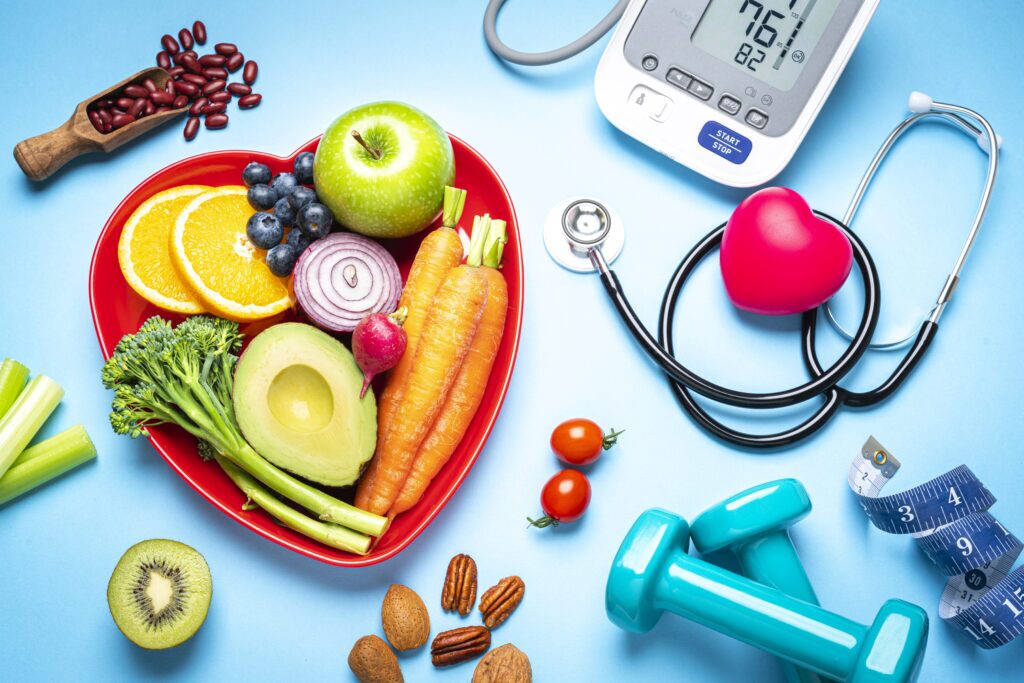Medical Review by Heidi Moawad MD
Summary:
- Not All cholesterol is the Same. HDL (High-Density Lipoprotein) is beneficial as it removes excess cholesterol, while LDL (Low-Density Lipoprotein) can contribute to plaque buildup in arteries, increasing cardiovascular risk.
- Dietary cholesterol doesn’t have as large an impact as previously thought, however, saturated and trans fats from certain types of foods (including red meat and fried foods) do have an effect on raising LDL cholesterol.
- Due to genetic factors, lifestyle habits, and diet affecting cholesterol levels, cholesterol management is crucial at any age. Making a positive impact on your heart health is important throughout your life.
- People of all body types, including those of an average or below-average body weight, can be affected by high cholesterol. Genetic predispositions and dietary choices can also influence your cholesterol levels.
- A holistic approach is important when working to hit target cholesterol levels. Combining medications with lifestyle changes can assist in managing cholesterol, and is essential for your overall heart health.
Be in the know when it comes to your cholesterol
There are many common misconceptions that may skew the perception of cholesterol when it comes to your personal health and diet. Cholesterol, and their levels and amounts, affect each individual differently and therefore it is important to have a clear history of your own personal health before making any assumptions.
Let’s debunk the myths and misconceptions and gain more knowledge on the effects of cholesterol, good and bad, on your overall health.
Myth1: all cholesterol is bad
There are two types of cholesterol to know:
High-Density Lipoprotein (HDL) Cholesterol: Considered a “good” cholesterol because it removes excess cholesterol from the bloodstream and transports it to the liver for excretion. This prevents the formation of plaque on the artery walls.
Low-Density Lipoprotein (LDL) Cholesterol: A “bad” cholesterol that can contribute to the build-up of plaque in the arteries and increases your chance of heart attack and stroke.
Cholesterol plays many essential roles in the body. Being a major component of cell membranes, cholesterol maintains the shape and stability of cells, allowing for proper function. Cholesterol is also a precursor to the synthesis of a variety of hormones including:
- Cortisol
- Aldosterone
- Estrogen
- Progesterone
- Testosterone
When sunlight hits the skin, a chemical reaction occurs that converts a form of cholesterol into vitamin D, which is crucial for bone health, immune function, and cognitive health.
In the liver, cholesterol is used to produce bile acids, which are integral to the digestion and absorption of dietary fats and fat-soluble vitamins.
Other functions of cholesterol include cell signaling and maintaining the integrity of neuronal membranes and supporting synaptic function.
Myth 2: eating high-cholesterol foods directly impacts your blood cholesterol levels
The relationship between dietary and blood cholesterol is controversial and has been a point of debate within the scientific community since the 1960s. While dietary cholesterol can have some effect on blood cholesterol levels, it is not the main factor for most people.
- High blood pressure is a major risk factor for developing cardiovascular disease, according to some researchers, hypertensive patients should take steps to reduce their cholesterol intake.
- Researchers recommend focusing on healthy habits, like exercising and maintaining a diet rich in vegetables, lean proteins, and whole grains, to lead a heart-healthy life.
Saturated and trans fats do have a more pronounced effect on raising the levels of “bad” cholesterol and can be found in foods such as:
- Red meat
- poultry, especially with skin
- lard and cream
- butter
- cheese
- ice cream
- coconut
- palm oil
- palm kernel oil
- some baked and fried foods
High amounts of these fats can increase LDL cholesterol and put you at risk of heart disease.
While the link between dietary cholesterol and blood cholesterol does exist, the extent of its impact on your health largely depends on your overall dietary picture. Be sure to add healthy components to your lifestyle, such as diet and exercise, and keep up with regular doctor check-ups to help minimize the risk of heart disease and stroke.
Myth 3: only older adults need to worry about cholesterol
Cholesterol management is crucial at any age. High cholesterol can even develop at a young age due to a variety of influences including genetic factors, poor dietary habits, and a sedentary lifestyle. Cholesterol does not discriminate against age, and it is imperative to begin managing cholesterol levels early on in life to reduce the risk of heart disease in your later years.
Regular health screenings help your healthcare provider identify potential problems and initiate goals and treatment plans to reduce symptoms and risks associated with high cholesterol.
You can also adopt a healthy lifestyle as a more holistic approach to your healthcare. Steps include:
- Maintaining a balanced diet of fruits, vegetables, and lean proteins
- Regular exercise, at least 30 minutes per day
- Avoiding smoking, and consuming alcohol in moderation
It is important to educate yourself on the importance of cholesterol management to reduce your risk of heart disease and to promote healthy aging.
Myth 4: thin people don’t have high cholesterol
High cholesterol can affect people of all body weights and sizes, including those in the normal range and even underweight individuals. People who don’t easily gain weight may also be unaware of their saturated fat and trans fat intake.
Diet: Although diet has less of an impact than originally thought, eating foods that aren’t part of a heart-healthy diet can contribute to higher levels of “bad” cholesterol in your blood.
Physical activity: Regular exercise can also play a part in maintaining cholesterol levels in the bloodstream. Exercise appears to enhance the ability of skeletal muscles to utilize lipids, reducing plasma lipid levels.
Your genetics and lifestyle choices can contribute to high cholesterol levels, regardless of body size, so it is imperative to add healthy components to your routine and diet to alleviate the risk of heart disease.
Myth 5: medications alone can solve high cholesterol
While medications can certainly play a vital role in the management of your cholesterol levels, they are only one part of the whole picture in terms of your overall health. Medications, such as statins, PCSK9 inhibitors, and bile acid sequestrants work to stem the problem at its source, but many preventative measures can be taken to alleviate the burden on medication alone. The medications used to maintain healthy cholesterol levels also come with side effects that can present their own challenges.
- Muscle pain and weakness
- Liver damage
- Digestive issues
- Increased blood sugar levels, which can lead to developing type 2 diabetes
- Memory loss and confusion
- In rare cases—numbness, tingling, and pain in the hands and feet
To help avoid further complications, it is important to adopt a healthy lifestyle in combination with medication therapy. Switching to a diet full of vegetables, legumes, and lean proteins alongside regular exercise will go a long way in maintaining your heart health and reducing your risk of stroke.
Myth 6: cholesterol testing is unnecessary if you feel fine
It’s deceiving but high cholesterol levels do not typically have any symptoms. It is important to check in with your healthcare professional for regular screenings, especially if you are at risk or genetically predisposed to high cholesterol.
If the high cholesterol condition is severe, fat deposits can form in tendons and skin, and severe pains in the stomach can occur due to an enlarged liver or spleen.
Check-in with your doctor and opt for regular screenings for high cholesterol. A simple blood test is all that’s required to check your lipid profile.
Stay on top of your cholesterol levels, regardless of misconceptions
We’ve gained some insight into the inner workings of cholesterol and its potential for risk. To recap, here are the myths and misunderstandings of cholesterol that we’ve touched on:
- Not all cholesterol is bad. In fact, we need healthy amounts of high-density lipoprotein (HDL) cholesterol in order to maintain proper cell function, synthesize vitamin D and certain hormones, and to support neuronal membranes and synaptic function.
- Dietary cholesterol does not have as big an impact on blood cholesterol as previously thought. Diet and exercise are always an important part of your overall health, but genetic factors can also be at play. It’s important to get insights into your family’s medical history to determine whether you are genetically predisposed to high cholesterol.
- High cholesterol can affect any person of any age and at any weight. Genetic precursors and lifestyle can also have an impact on a person’s cholesterol levels no matter their age or body type.
- Medications do play an important role in the maintenance of cholesterol levels, but they are not a one-and-done solution. It is up to the individual to also improve their lifestyle, including making proper dietary changes and adding in at least 30 minutes of exercise per day alongside medication therapy. This will also improve your overall health and help you decrease your dependence on medication alone.
- Even if you feel fine, don’t wait for a major health event to happen to be screened for high cholesterol. High cholesterol levels often don’t present any symptoms. Regular check-ups are important for maintaining your health and preventing the onset of disease.
It is important to keep up to date on your health and to make decisions based on knowledge from trusted sources. The Lemonaid Health team is here to help if you have any questions or concerns about your well-being. Let us personalize a treatment plan for you and get you on your way to achieving your health goals. Learn about your options to manage your cholesterol at Lemonaid Health.












